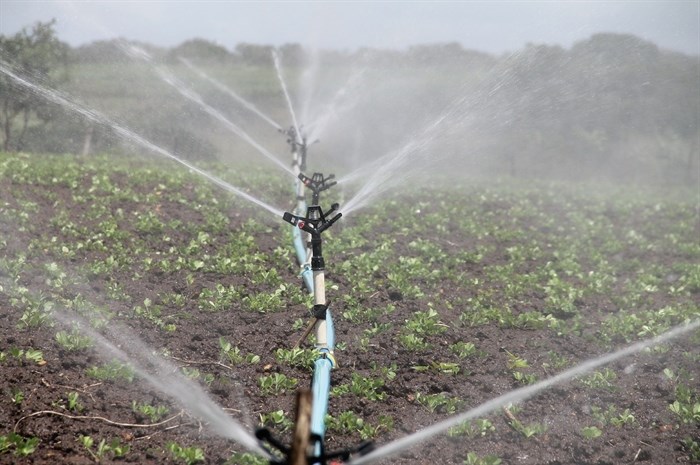
FILE PHOTO
Image Credit: SUBMITTED/Pixabay
September 15, 2023 - 5:00 AM
Westwold area farmers stand to lose millions of dollars after the province ordered all irrigation to stop in the Salmon River valley.
The area is home to several farms that grow feed for the BC cattle industry, but they were forced to stop irrigating in the middle of August and it came as a surprise.
"My family has been farming and irrigating since 1970. Never has there been this level of irrigation curtailments by the government. By this decision being made without any consultation from the agricultural community, it has been crippling," local farmers Erik and Gaylene Bluff said in an email.
They own 1 Plus Cattle and called the province's enforcement order "heavy-handed." RCMP joined Natural Resource Officers earlier this month as they carried out a search warrant on their property to see if they've been using the irrigation system since Aug. 15.
READ MORE: Pest that caused $1 billion in damages to US corn found in North Okanagan
Their lawyer, Joe Killoran, said area farmers have been met with silence as they try to get the Ministry of Forests to explain the science behind its order.
Farmers in the area were asked earlier this season to reduce their water usage. Some complied, but it's not clear how many or how that affected Salmon River levels.
Irrigation systems in the area are not directly connected to the river, however. Most are connected through wells to below-ground aquifers, but it's not clear how much irrigation is affecting river levels as the province deals with severe drought conditions.
A provincially-operated well measures the groundwater levels between the railroad and Highway 97. In early August, groundwater dropped below the ten-year average, but remained above its lowest measured levels, according to the provincial government website.
Doug Haughton, area director from the Thompson Nicola Regional District, has also been waiting on a response from the ministry that brought the order. He said the situation is "heating up" in the area as farmers grow frustrated, expecting an explanation can help ease the tensions.
READ MORE: When it comes to water security, small rural communities in BC largely left high and dry
"You've got two things that are most valuable to (farmers): land and water. If you screw around with either one of them, it could cause chaos," Haughton said. "To me the government went around it wrong. They should have had dialogue with people in the valley and explain it to them. That's all I'm asking them for."
A total of 398 water licences were given the temporary orders to stop irrigation. A ministry spokesperson said the wells, although not directly pulling from the river, are all interconnected to the Salmon River, even several kilometres from the river itself.
"The studies and data collected by the province indicate clearly that the wells in the Salmon River area are connected to the river," a spokesperson said in an emailed response.
The ministry is standing by the decision to impose the orders, saying they are a "last resort" as drought conditions continue. Farmers in the area have been ticketed for defying the order, but the ministry didn't say how many or how much their tickets will cost them.
The ministry also said it spoke with farmers, local, provincial and federal officials in the months leading up to the order, beginning weekly on May 31, acknowledging some did voluntarily reduce their water use before the order came into effect.
"Many farmers were already seeing challenges from wildfires and drought, and many stepped up to voluntarily conserve water. Thank you to everyone in BC who has been voluntarily reducing their water use, and those who are adhering to water restrictions and temporary protection orders," the ministry said.
The order Forest Minister Bruce Ralston signed restricts irrigation for crops like corn, alfalfa and legumes and is set to last from Aug. 15 to Sept. 30. The crops affected are typically used to feed livestock, while irrigation is still allowed for vegetables, fruits and at tree nurseries.
At the time of the order, the river dropped below 1.25 cubic metres of flow per second, so low it threatens the survival of Thompson River Chinook salmon, according to the order.
The irrigation order will continue to the end of this month or until the area gets "significant" rain, but that isn't expected in time to protect the salmon, according to the order.
Of the three other orders Ralston signed, irrigation has been restricted near one other creek that connects to the Thompson River.
Bessette Creek near Lumby dropped below one cubic metre per second of flow, which also threatens the salmon, according to the order.
There are no other Interior aquifers being restricted, and the other two Ralston signed restrict irrigation near rivers on Vancouver Island.
To contact a reporter for this story, email Levi Landry or call 250-819-3723 or email the editor. You can also submit photos, videos or news tips to the newsroom and be entered to win a monthly prize draw.
We welcome your comments and opinions on our stories but play nice. We won't censor or delete comments unless they contain off-topic statements or links, unnecessary vulgarity, false facts, spam or obviously fake profiles. If you have any concerns about what you see in comments, email the editor in the link above. SUBSCRIBE to our awesome newsletter here.
News from © iNFOnews, 2023